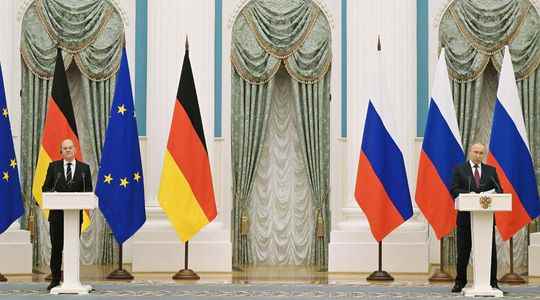Olaf Scholz could not have hoped for better. Vladimir Putin waited until Tuesday, the day of their meeting in the Kremlin, to begin a withdrawal of Russian troops massed on the border with Ukraine. The day before, when Washington insisted again on the imminence – potential – of an invasion, the German Chancellor asked for “immediate signs of de-escalation” from Russia. And here he is heard, since the Russian president, master of the clocks in the rise of tensions between Moscow and Kiev, responded favorably to his request.
This coincidence owes nothing to chance: Putin pampers Germany and its chancellor. Among Western leaders, Olaf Scholz is the one who has shown the greatest restraint when it comes to responding to Russian threats, constantly insisting on the need to “dialogue” and avoid provocations. A lack of clarity denounced, for a time, by the Baltic countries and Poland. The Chancellor also made it a principle never to directly mention the German-Russian gas pipeline Nord Stream 2, while insisting that any Russian attack would have “serious consequences” for Russia.
“In the end, it was rather clever on his part, because it could suggest that Berlin was ready for sanctions aimed at other gas pipelines, such as Nord Stream 1 or the one passing through Poland, estimates Hans Stark, adviser for Franco-German relations at IFRI. It would be wrong to think that Olaf Scholz acted with weakness or indulgence with regard to Russia.” At the end of the press conference with Vladimir Putin on Tuesday, he also affirmed that the conviction of the Russian opponent Alexei Navalny, tried the same day, would be “incompatible with the principles of a rule of law” .
Part of pro-Russian German opinion
By confirming in front of the cameras “the partial withdrawal of the military” from the border with Ukraine, the Russian president is also nurturing German opinion which is more favorable to him than in other European countries. “Sympathy for Russia is still strong in East Germany and among the older generations, recalls Hans Stark. This is also the case within German business circles, which have invested heavily in this country.” These premises of de-escalation reassure them all the more since Russian gas represents approximately 55% of German imports (40% in total for the European Union).
This Moscow visit comes to close the rather successful entry of Olaf Scholz on the international scene. He reassured Joe Biden in Washington on February 7, before giving pledges to Ukraine on Monday by renewing Berlin’s financial aid, the largest from a foreign country. His passage through Maidan Square, where he placed a candle at the monument in memory of the victims of the 2014 revolution, was greeted by the mayor of the capital Vitali Klitschko. The former heavyweight boxer recognized “a gesture of respect”, he who spoke at the end of January of the “treason” of Germany, for having blocked a delivery of arms to his country.
In this respect, the diplomatic tour is like an accelerated apprenticeship for the new Chancellor, when he has only been in office since December. “We must not forget that he was pushed onto the international scene without the break-in time from which Angela Merkel or even Emmanuel Macron had benefited, specifies Hans Stark. came out well… if the Russian pressure continues to diminish.” An assessment that depends, in large part, on Vladimir Putin.
